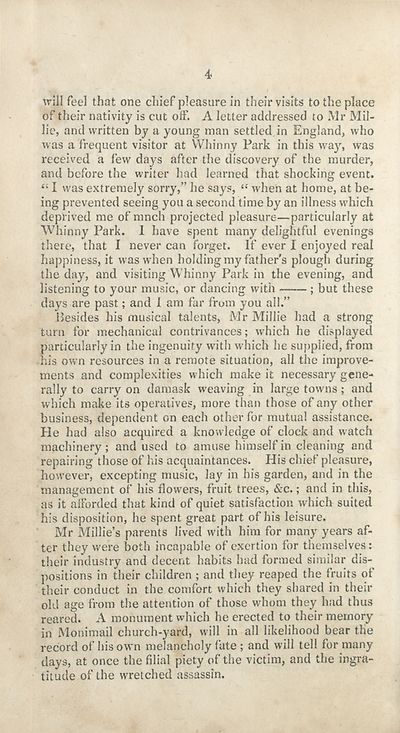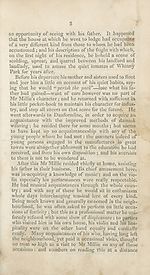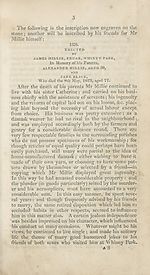Download files
Complete book:
Individual page:
Thumbnail gallery: Grid view | List view

4
will feel that one chief pleasure in their visits to the place
of their nativity is cut off. A letter addressed to Mr Mil¬
lie, and written by a young man settled in England, who
was a frequent visitor at Whinny Park in this way, was
received a few days after the discovery of the murder,
and before the writer had learned that shocking event.
“ I was extremely sorry,” he says, “ when at home, at be¬
ing prevented seeing you a second time by an illness w’hich
deprived me of much projected pleasure—particularly at
"Whinny Park. 1 have spent many delightful evenings
there, that I never can forget. If ever I enjoyed real
happiness, it was when holding my father’s plough during
the day, and visiting Whinny Park in the evening, and
listening to your music, or dancing with ; but these
days are past; and I am far from you all.”
Besides his musical talents, Mr Millie had a strong
turn for mechanical contrivances; which he displayed
particularly in the ingenuity with which he supplied, from
his own resources in a remote situation, all the improve¬
ments and complexities which make it necessary gene¬
rally to carry on damask weaving in large towns; and
which make its operatives, more than those of any other
business, dependent on each other for mutual assistance.
He had also acquired a knowledge of clock and watch
machinery; and used to amuse himself in cleaning and
repairing those of his acquaintances. His chief pleasure,
however, excepting music, lay in his garden, and in the
management of his flowers, fruit trees, &c.; and in this,
as it afforded that kind of quiet satisfaction which suited
his disposition, he spent great part of his leisure.
Mr Millie’s parents lived with him for many years af¬
ter they were both incapable of exertion for themselves:
their industry and decent habits had formed similar dis¬
positions in their children ; and they reaped the fruits of
their conduct in the comfort which they shared in their
old age from the attention of those whom they had thus
reared. A monument which he erected to their memory
in Monimail church-yard, will in all likelihood bear the
record of his own melancholy fate ; and will tell for many
days, at once the filial piety of the victim, and the ingra¬
titude of the wretched assassin.
will feel that one chief pleasure in their visits to the place
of their nativity is cut off. A letter addressed to Mr Mil¬
lie, and written by a young man settled in England, who
was a frequent visitor at Whinny Park in this way, was
received a few days after the discovery of the murder,
and before the writer had learned that shocking event.
“ I was extremely sorry,” he says, “ when at home, at be¬
ing prevented seeing you a second time by an illness w’hich
deprived me of much projected pleasure—particularly at
"Whinny Park. 1 have spent many delightful evenings
there, that I never can forget. If ever I enjoyed real
happiness, it was when holding my father’s plough during
the day, and visiting Whinny Park in the evening, and
listening to your music, or dancing with ; but these
days are past; and I am far from you all.”
Besides his musical talents, Mr Millie had a strong
turn for mechanical contrivances; which he displayed
particularly in the ingenuity with which he supplied, from
his own resources in a remote situation, all the improve¬
ments and complexities which make it necessary gene¬
rally to carry on damask weaving in large towns; and
which make its operatives, more than those of any other
business, dependent on each other for mutual assistance.
He had also acquired a knowledge of clock and watch
machinery; and used to amuse himself in cleaning and
repairing those of his acquaintances. His chief pleasure,
however, excepting music, lay in his garden, and in the
management of his flowers, fruit trees, &c.; and in this,
as it afforded that kind of quiet satisfaction which suited
his disposition, he spent great part of his leisure.
Mr Millie’s parents lived with him for many years af¬
ter they were both incapable of exertion for themselves:
their industry and decent habits had formed similar dis¬
positions in their children ; and they reaped the fruits of
their conduct in the comfort which they shared in their
old age from the attention of those whom they had thus
reared. A monument which he erected to their memory
in Monimail church-yard, will in all likelihood bear the
record of his own melancholy fate ; and will tell for many
days, at once the filial piety of the victim, and the ingra¬
titude of the wretched assassin.
Set display mode to:
![]() Universal Viewer |
Universal Viewer | ![]() Mirador |
Large image | Transcription
Mirador |
Large image | Transcription
| Antiquarian books of Scotland > Crime & punishment > Whinny Park murder > (18) |
|---|
| Permanent URL | https://digital.nls.uk/126150881 |
|---|
| Description | Thousands of printed books from the Antiquarian Books of Scotland collection which dates from 1641 to the 1980s. The collection consists of 14,800 books which were published in Scotland or have a Scottish connection, e.g. through the author, printer or owner. Subjects covered include sport, education, diseases, adventure, occupations, Jacobites, politics and religion. Among the 29 languages represented are English, Gaelic, Italian, French, Russian and Swedish. |
|---|

